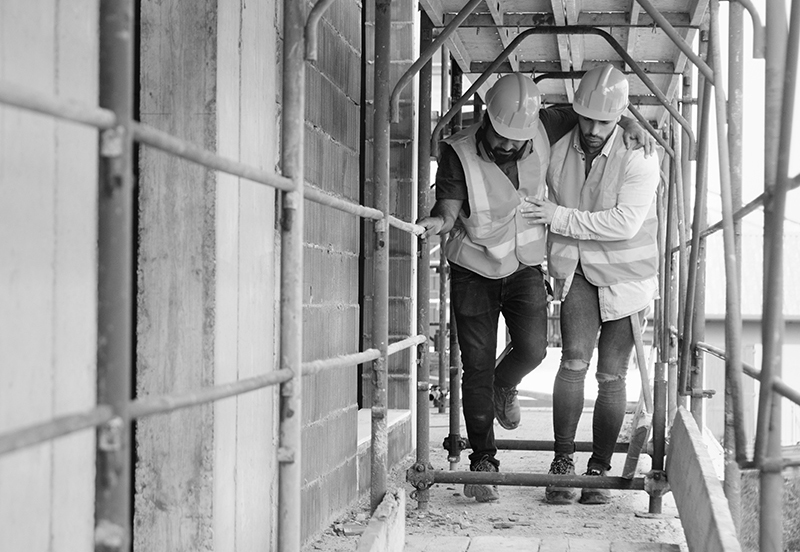Navigating Construction Accident Lawsuits

Live Help NOW  800-809-3776
800-809-3776
Navigating Construction Accident Lawsuits
Have you been injured on a construction worksite?
If so, you are among the 10% of construction workers (tens of thousands) injured on the job each year. These workers, like their colleagues, assumed they were working under safe conditions with properly functioning equipment. Sadly, sometimes this isn’t the case. In many instances these injuries could have been prevented if proper safety protocol had been followed to keep equipment functioning safely and employees properly trained.
Construction site hazards
The Occupational Safety and Health Administration (OSHA) lists the following potential hazards for construction workers:
- Falls (from heights)
- Trench collapse
- Scaffold collapse
- Electric shock and arc flash/arc blast
- Failure to use proper personal protective equipment
- Repetitive motion injuries
(Note: According to the Bureau of Labor, falls, struck by object, electrocutions and caught-in/between accidents are the causes of the majority of fatal construction site accidents.)
Any of these (and other) hazards can lead to injury, or even death. While accidents happen that are not caused by negligence or the direct fault of another person or party, sometimes there is a specific cause or responsible party. In these cases, the party responsible for the accident is also responsible for the accompanying costs of medical care and treatment – and even pain and suffering.
Third party (personal injury) lawsuits
It’s important to note that you cannot sue your employer for being responsible for a workplace accident. Employers have Workers Compensation insurance to protect them against lawsuits and provide coverage for employees that are injured on the job.
However, if you’ve been injured on a construction site and believe that someone other than your employer is “to blame” for the accident, you may have grounds for a lawsuit. These third-party suits are the legal process for holding another party responsible for an accident.
Some examples of third-party responsibility are:
- If you are driving as part of your job at ABC Corp. and you are rearended by a truck from company XYZ Inc. you can sue XYZ Inc. AND collect workers compensation benefits from ABC Corp.
- If you are hurt on a construction site due to a general contractor’s failure to ensure that the job site was safe, you might be able to sue that general contractor.
- If you are hurt at work while using a new machine, you could sue the manufacturer of that machine.
To determine whether you should file a workers compensation claim or a personal injury claim, begin by asking yourself “Whose fault is this accident?”
- If you are partially to blame for the accident, file a workers compensation claim. You do not have to prove the fault of an employer, co-worker or other party and are still entitled to receive benefits.
- If the injury was directly caused by another party (i.e. a general contractor or equipment manufacturer), consider filing a third-party claim with the assistance of a personal injury attorney.
- If the injury was the result of someone else’s negligence, you should seek legal counsel to file a third-party lawsuit.
- If the injury only involves minor symptoms, such as cuts and bruises, you do not need to file a claim of any sort.
Hiring a personal injury attorney for a construction accident claim
Finding the right attorney to help you with your construction accident personal injury claim is important. You should hire an attorney who is both compassionate and knowledgeable about the law and your specific type of injury. All first consultations are free, and personal injury lawyers represent clients on a contingency fee basis. This means that you are only required to pay your attorney a previously specified percentage of the settlement if you win your lawsuit.
Timeliness is important in construction accident personal injury claims. There are statutes of limitations on how much time you are permitted to file a lawsuit. If you procrastinate, you may lose the opportunity to file a compensable claim against a negligent party. Your attorney will help you negotiate with the insurance company and will also know the right amount of money to recover for your injury. He or she will also ensure that your medical bills are paid on time so that late payments do not affect your credit.
If you negotiate with the negligent party’s insurance agency, you may harm your chances of obtaining satisfactory remuneration. You need to hire a personal injury attorney if an insurance adjuster asks you to sign any type of release form. Signing the form without legal representation may prevent you from filing a lawsuit entitling you to win a substantial legal settlement.
.

